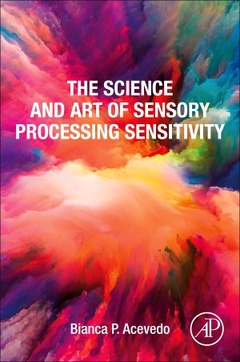Description
The Science and Art of Sensory Processing Sensitivity
Author: Acevedo Bianca P.
Language: English
Subjects for The Science and Art of Sensory Processing Sensitivity:
200 p. · 15x22.8 cm · Paperback
Description
/li>Contents
/li>Biography
/li>Comment
/li>
As such, a variety of readers will benefit from its discussions regarding SPS in the workforce, education, and in personal relationships, as well as techniques that enhance well-being for those with SPS.
1. Introduction on Being Sensitive 2. High Sensitivity vs. Mood Disorders 3. SPS and Focus Issues 4. SPS and Autism 5. SPS and Sensory Disorders 6. SPS styles 7. Techniques for living well with SPS
Dr. Bianca P. Acevedo is a research scientist at the University of California, Santa Barbara and lives in New York City where she engages in consulting work while writing. She has a B.A. in Psychology from NYU and a PhD in Social/Health Psychology from Stony Brook University. She has done extensive research on the neural basis of high sensitivity, attachment and romantic love, and mind-body interventions; and taught courses such as Positive Psychology, Social Neuroscience, and Close Relationships. Her book, “The Highly Sensitive Brain was nominated for the 2021 PROSE Award, and she was the recipient of the 2012 International Women in Science Award. Her work has been funded by the National Science Foundation, the National Institute of Health, and the Alzheimer’s Association.
- Describes the mechanisms and neurobiology underlying sensory processing sensitivity
- Distinguishes SPS from seemingly related disorders including ADD, Autism Spectrum Disorder, schizophrenia, anxiety, burn-out, and depression
- Uniquely covers variations in SPS and the association of different combinations with personality traits and different outcomes
- Details the relationship of SPS with personality features including extraversion, sensation-seeking, empathy, and curiosity
- Provides techniques based in recent scientific advances to improve quality of life for individuals with SPS
- Features implications of SPS in the workforce, education, and in personal relationships

